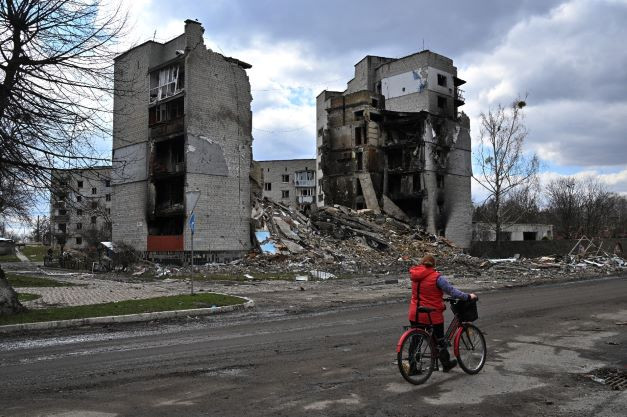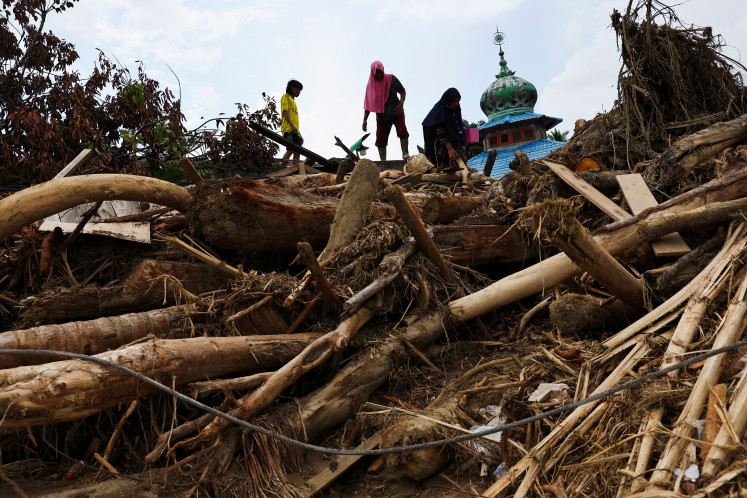Popular Reads
Top Results
Can't find what you're looking for?
View all search resultsPopular Reads
Top Results
Can't find what you're looking for?
View all search resultsWar In Ukraine will not fray Indo-Pacific strategy
All evidence points to a conclusion that any argument that the war of aggression against Ukraine has weakened the IPS is totally spurious.
Change text size
Gift Premium Articles
to Anyone
B
rahma Chellaney, one of India's leading geopolitical thinkers, has affirmed in the heading of an opinion article published on March 11, 2022 in Nikkei Asia that "Ukraine war puts US Indo-Pacific strategy in jeopardy".
This view is structurally and strategically flawed, as Chellaney’s parameter focuses on the “diluted” Quadrilateral Security Dialogue (QSD), or Quad, per his selective reading of President Joe Biden's Indo-Pacific strategy, especially on the Quad.
Yet, how the Quad must hang tightly together, with Australia, India, Japan and the United States functioning as one and the same, is the countervailing mechanism to the purported revisionism of China in the “Himalayas and the South China Sea”. The two areas Chellaney has flagged ignore one critical factor.
It was India that chose not to aggrandize their Russian partner by abstaining from condemning the actions of President Vladimir Putin in the special emergency session on the “Unity for Peace” resolution of the United Nations General Assembly in early March.
Somewhat ironically, India's stance at the emergency session, which had been convened for only the 10th time since the UN was founded in 1945, mirrored that of China.
On the contrary, the "war" in Ukraine, more precisely the Russian aggression, was the fault of the West, as John Mearsheimer has put it. But such folly by Putin, Mearsheimer argues, would be the best way yet to wreck Russia.
China, acutely aware of this warning, has pivoted to playing the role of "mediator" to save Putin.
Moreover, Australia, one of the fist countries to take after then-Japanese prime minister Abe Shinzo's rallying call for a rules-based Indo-Pacific Strategy (IPS) and Free and Open Indo Pacific (FOIP) in 2013, has instantly committed to an extra US$8.2 billion to reinforce its future naval facilities.
Indeed, the Reciprocal Access Agreement (RAA) between Prime Minister Scott Morrison and his Japanese counterpart Kishida Fumio in January 2022 has now enjoyed a sudden "strategic bonanza".
What is good for the goose is good for the gander. The AUKUS trilateral defense pact, formed on Sept. 15 2021 by Australia, the US and the United Kingdom, is now beefed up.
Accordingly, the European Union, which has a policy framework on IPS and FOIP, is now more alert than ever to the dangerous situation at the 38th parallel in the Korean Peninsula and the Taiwan Strait.
After all, North Korea and Taiwan are the last vestiges of the old Cold War in Asia that have not thawed. Yet, the ember of a new Cold War has been stoked in Europe.
Finally, Japan has also agreed to go above its insipid 1 percent defense spending vis-à-vis its gross domestic product (GDP).
Germany has taken the same approach to increase its defense spending, as have the UK and the Dutch. The Quad, RAA and AUKUS are getting stronger. In this context, it must surely beguile the epistemic community on IPS and FOIP how Chellaney could reach such a conclusion, not unless he has allowed his Indian nationalist view to obfuscate his “strategic clarity”.
Indeed, if more evidence is needed, they are as follows. Writing in the conservative National Interest, Elliot Cohen argues that US defense spending cannot hover at 4 to 5 percent anymore. Nor must any US president entertain the idea that "no two great wars" can happen simultaneously. If anything, they can.
Former Harvard University president Larry Summers, who identifies himself as a "political economist, not an economist", categorically affirmed when he appeared last week on CNN’s Fareed Zakaria GPS that more than anything else, even at the risk of a US-wide inflation, this is a "price all Americans must pay to protect the freedom of our world order".
Zakaria weighed in on a separate stand-alone GPS episode, calling for even more sanctions against Russian oil and liquefied natural gas (LNG) exports to the US and the EU. This is especially the case with the US, as it is a major oil and shale exporter and merely 10 percent reliant on the Russian energy combo. If anything, US energy companies can step up to the fore to be the key supplier of the EU and all allies.
Granted that out of the US’s nine formal security allies in the world, five of which are Australia, Japan, the Philippines, Thailand and New Zealand, it goes without saying that Zakaria had them in mind, too.
More importantly, the Pentagon has accelerated its hypersonic jet program to make their first successful testing by September. While ambitious and prone to failure, one cannot discount that the US may succeed, too.
After all, it was China and Russia, both of which claimed in June 2020 to have been first in producing 13 antidotes against the SARS-Cov-2 virus that causes COVID-19, only to see the US come up with more effective mRNA vaccines in December 2020.
As for China, it has been backpedaling from what was a Sino-Russian bilateral tie "without limitations", in which no forbidden areas would be left unexplored, soon after war broke out in Ukraine. It is now asking all sides to sue for peace while the cost of oil continues to climb, leading to a faster inflationary spiral.
The China Institutes of Contemporary International Relations (CICIR), which is closely connected to the Ministry of Public Security, has adamantly insisted that it was the West that would receive the brunt of the economic pains first.
Yet, it is China that has close to 800 million middle-class citizens. It cannot be lost on these "analysts" at the CICIR that it is always the middle class that has the highest expectations of the government.
In fact, while China’s social media seems reticent on the war in Ukraine, most citizens are in fact against Russia invading another country, as this action is diametrically against the key nonintervention rule of the Five Principles of Peaceful Coexistence coined by the much-revered premier, Zhou Enlai.
Thus, any argument that the war of aggression against Ukraine has weakened the IPS is totally spurious. Within two weeks, there are now 20,000 mercenaries in Ukraine, as opposed to the 30,000 “global Salafists” still remaining in Libya.
For what it is worth, when push comes to shove, just as Russia is not against using Syrian veterans of President Bashar al-Assad against armed civilians and Ukrainian troops, neither do the US and EU hold any qualms against unleashing battle-hardened Islamic State “jihadists” against the Russians, who have not made any significant advances against Kyiv.
***
Stephen Nagy is a senior associate professor at International Christian University, Tokyo; Phar Kim Beng is CEO founder of the Strategic Pan Indo-Pacific Arena.










